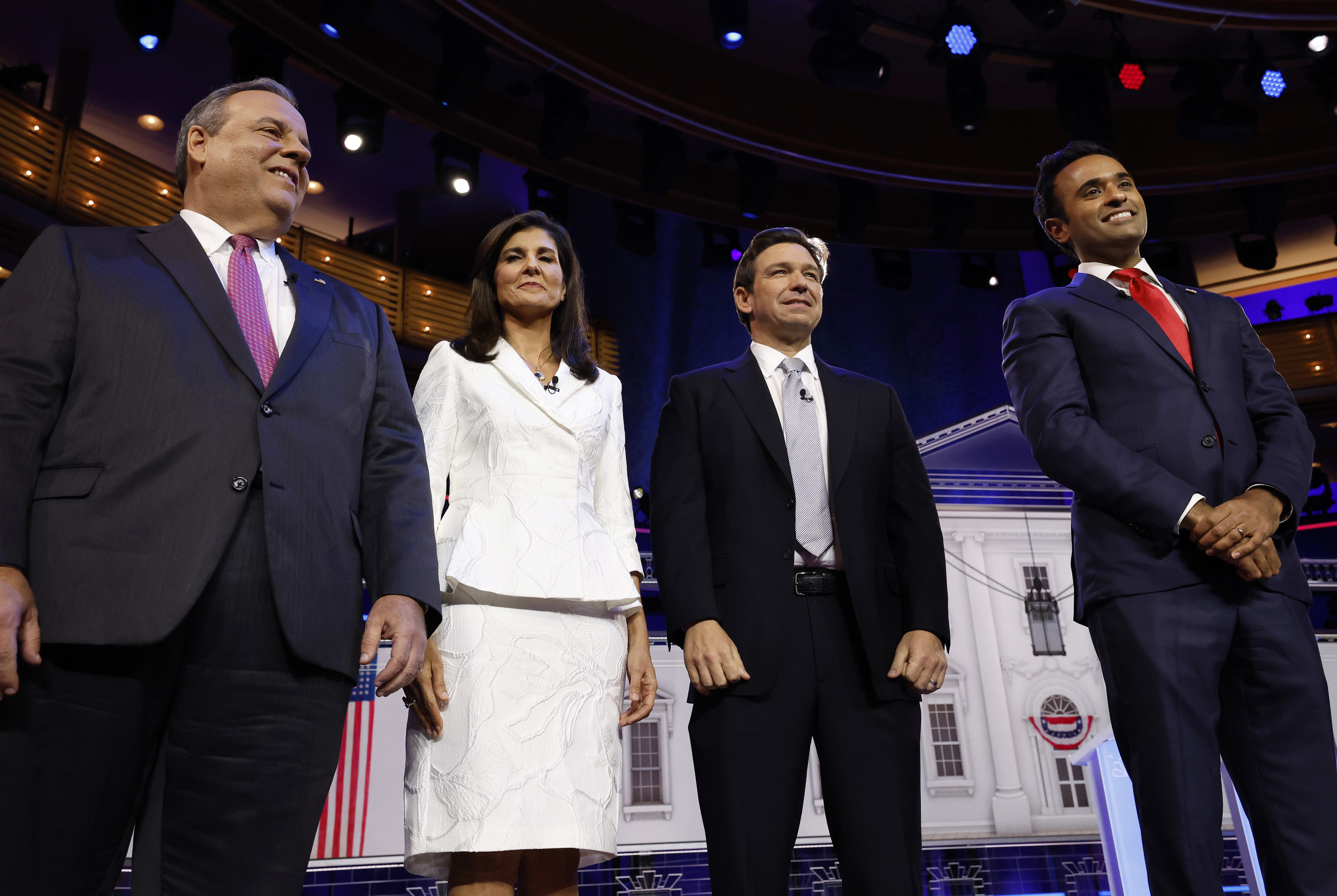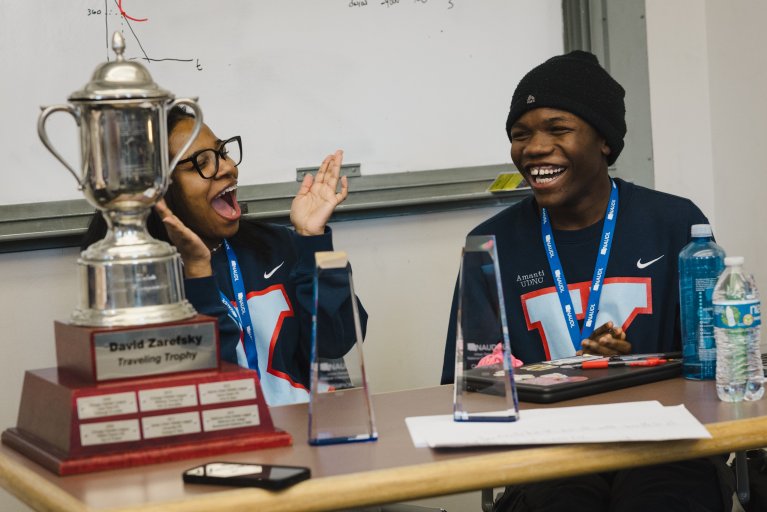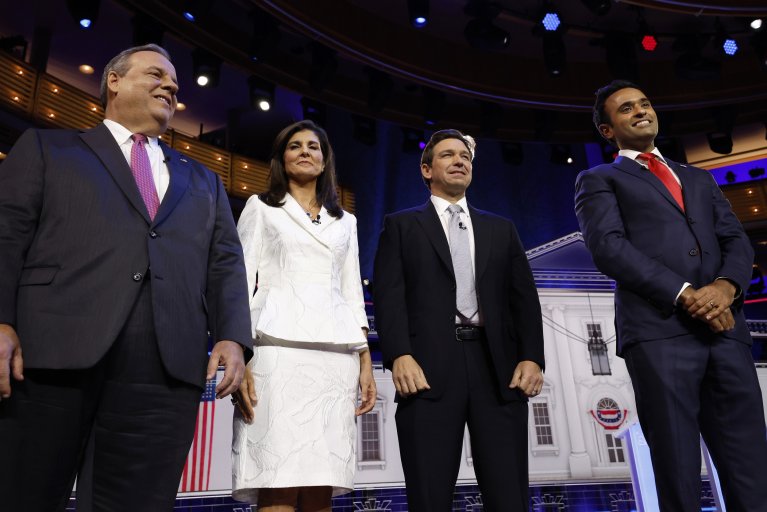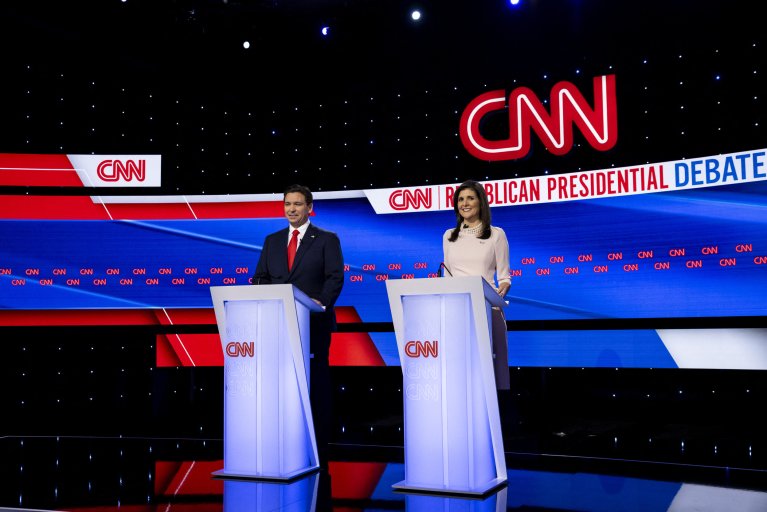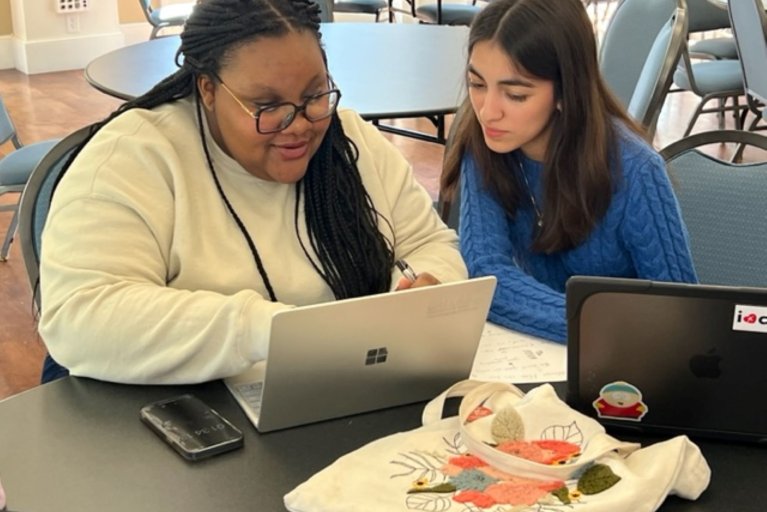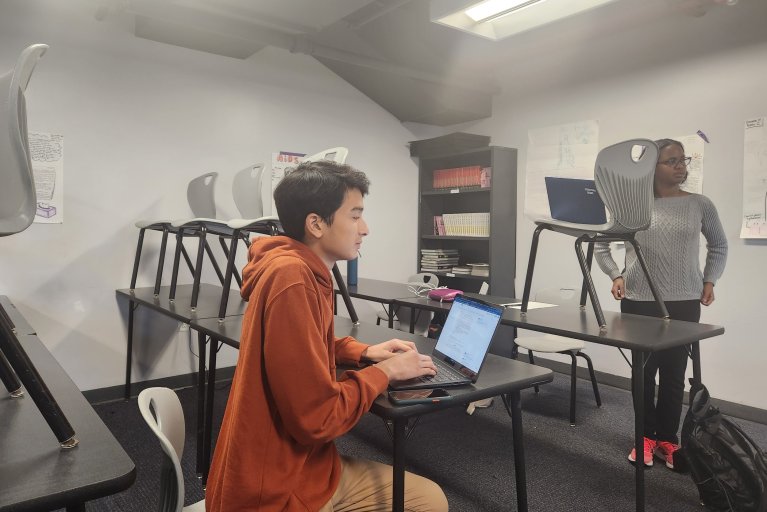Jan 20, 2024 At 11:13 AM EDT
- In this article, eight varsity high school debaters—four from the Dallas Urban Debate Alliance (DUDA) and four from the Silicon Valley Urban Debate League (SVUDL)—provide their analysis of how four GOP presidential candidates performed during the most recent stretch of primary debates.
- The student debaters did not focus on the politics of the candidates' positions; instead, they were concerned with whether the candidates made the most of the debate process and were successful onstage. The students considered how well each candidate answered questions from moderators, how they presented their plans, interacted with other candidates and appealed to audiences.
- During the Republican debates, former President Donald Trump, the current front-runner in the race, has refused to participate.
- This week, Trump secured a major victory over his Republican opponents at the Iowa caucuses. Florida Governor Ron DeSantis came in second, with former U.N. Ambassador Nikki Haley close behind in third.
- The GOP primary field has narrowed in recent weeks, with former New Jersey Governor Chris Christie and entrepreneur Vivek Ramaswamy dropping out of the race.

Ron DeSantis
Candidate Debate Analysis:
On face value, Florida Governor Ron DeSantis has had an underwhelming showing in the GOP primary process so far. While other competitors like Vivek Ramaswamy and former South Carolina Governor Nikki Haley have been able to propel their reputations within the Republican party—due in part to exposure on the debate stage—DeSantis appears to have taken a few steps back. When he first announced his campaign, DeSantis was discussed as a potentially legitimate alternative to former President Donald Trump; on Monday, he finished far behind Trump in the Iowa caucuses, and just above Haley.
However, the truth is that DeSantis' presence on the debate stage may have really benefitted him. Although his performance behind the podium started a bit shaky, DeSantis built momentum throughout the debate cycle, with his best showing being the January face-off between himself and Haley. At least through the debate season over the past few months, DeSantis immensely improved at connecting with the audience.
Right now, DeSantis is one of the last candidates standing, so he could still end up as a second-choice candidate for Trump supporters if the former president is unable to run due to the legal issues he's facing. And, looking ahead to 2028, DeSantis appears to be positioned as the most formidable GOP candidate for that contest—assuming Trump will no longer be in the running.
— Hope, Dallas Urban Debate Alliance
Ron DeSantis
Candidate Debate Analysis:
Ron DeSantis needed to establish himself as a preferable candidate in the GOP primary debates—not only over Nikki Haley and the other Republicans featured on the debate stage, but also over Donald Trump. But in part because of the various similarities between him and Trump (DeSantis stated in the most recent debate, for example, that under his administration, the U.S. would continue to build a wall along the country's southern border), DeSantis ultimately has not accomplished what he needed to during the debate cycle.
At one point during the recent Iowa debate, DeSantis tried to draw a distinction between himself and Trump while also appealing to viewers. "Donald Trump is running to pursue his issues, Nikki Haley is running to pursue her donors' issues, I'm running to pursue your issues," he said. This rhetorical choice was clearly meant to position himself as the candidate who has the voters' needs in mind over his own. But this approach is not specific and doesn't include any actual policy discussion. It might engage the audience more directly, but that sort of line doesn't really clarify how his policies differ from those of his opponents.
Although DeSantis' audience engagement was high during the Iowa debate (when it was just him and Haley onstage), and his speaking style was strong, he was still focused on making himself out to be a more presentable version of Trump, one without the baggage of court cases and legal troubles. Ultimately, that doesn't seem like it was a strong enough of a distinction to really make DeSantis stand out, even if he was connecting with the crowd.
— Chloe, Silicon Valley Urban Debate League

Nikki Haley
Candidate Debate Analysis:
Nikki Haley coming in third in the Iowa caucuses might be a letdown to her supporters, but it's worth remembering that there were some doubters who didn't think the former South Carolina governor would even get to third place just a couple of months ago. It was a crowded field and Haley has outlasted the pack—and her time on the debate stage helped her accomplish that goal. She used her background as a more moderate Republican and her ability to respond to abrasive attacks with fire of her own to leapfrog many of her opponents.
Speaking of those attacks: There were times during the debate cycle when Haley appeared to be the main target of candidates like Vivek Ramaswamy and Florida Governor Ron DeSantis. It could be argued that being in the crosshairs meant Haley was seen as a real threat to be the runner-up to former President Donald Trump.
And because of her more moderate stances, Haley has been able to present herself as a real alternative to Trump, unlike some other candidates, who are more interested in highlighting their similarities to the former president. Many people in Republican politics might look down on Haley for being more measured on specific issues, but she has brought a different perspective that seems to resonate with some GOP voters.
Regardless of how this primary develops, it's obvious that Haley has raised her profile and will likely be a force in national politics in elections to come. This cycle isn't completely over, though: The New Hampshire primary could end up favoring a more moderate Republican.
— Hank, Dallas Urban Debate Alliance
Nikki Haley
Candidate Debate Analysis:
Nikki Haley's run as a presidential candidate has gotten her through the Iowa caucuses and up to Tuesday's New Hampshire primary, but she hasn't yet succeeded in eliminating Ron DeSantis from the contest or taking the lead from Donald Trump. However, she has had successes on the debate stage—and one of her most effective arguments has been on the topic of immigration.
Haley has backed up her position—that the U.S. should deport immigrants who have entered the country illegally—by drawing on her personal experience as the child of immigrants. She has emphasized that her parents came to America "the right way," and said that's how immigration should be done. She has also summarized her concerns by paraphrasing something her parents apparently said—that if people don't follow the law when coming into the country, then they're not likely to follow the law when they're actually in the country. It's a clever way to not simply share her own opinions on the subject, but to also bring in the perspective of people with firsthand experience of immigration.
Additionally, Haley's self-assured voice helps her arguments flow easily on the debate stage. And when she's been attacked by other candidates, she's usually been ready with a comeback that leaves the audience cheering.
— Cristel, Silicon Valley Urban Debate League

Chris Christie
Candidate Debate Analysis:
Chris Christie, one of Donald Trump's biggest critics, has failed to take down the Republican front-runner. Christie gave some decent performances on the GOP debate stage, and provided the audience with some humorous moments, but that wasn't enough for him to make a real impact on the race for the party's presidential nomination.
From the beginning, Christie's campaign drew attention for its willingness to be so blatantly anti-Trump. (It was especially noteworthy, considering how Christie jumped on the Trump bandwagon back in the 2016 election cycle.) But even though a portion of Republican voters say they feel similarly to Christie—that they don't want Trump to return to the White House—that didn't translate to sufficient support for the former governor of New Jersey, who couldn't manage to compete at quite the same level as even Ron DeSantis and Nikki Haley.
Christie's strongest moments on the debate stage came when he was able to put the other GOP candidates in the hot seat and point out their avoidant debate tactics. But when it comes to Trump, Christie's blunt approach has been less effective with voters—the former president is still leading in the polls and scored a major victory on Monday with the Iowa caucuses. If Trump's big win in Iowa is a sign of how Republicans across the country feel about him, then it's no wonder that the candidate who was most critical of Trump failed to last in the race. Ultimately, Christie did not accomplish what he needed to in the primary debate process.
— Katelyn, Dallas Urban Debate Alliance
Chris Christie
Candidate Debate Analysis:
After running on a somewhat more moderate platform and positioning himself as an anti-Trump candidate, Chris Christie ended his presidential campaign on Jan. 10. While the former New Jersey governor talked tough on the debate stage (particularly about Donald Trump, with references to his serious legal troubles), Christie still failed to build any real momentum coming out of the various GOP debates this primary season.
Too often in the debates, Christie either redirected or avoided questions from moderators to instead focus on his preferred talking points. He also allowed himself to be interrupted too many times, and let opponents steal the spotlight from him.
Now, Christie is out of the race, after failing to earn enough support from Republicans and enough cheers from debate audiences. Looking at the polls, none of Christie's attacks on Trump seem to have stuck.
— De'Angelo, Silicon Valley Urban Debate League

Vivek Ramaswamy
Candidate Debate Analysis:
When Vivek Ramaswamy first took the GOP primary debate stage back in August, he acknowledged that he did not fit the mold of a traditional Republican presidential candidate with a line borrowed from Barack Obama: "Who the heck is this skinny guy with a funny last name, and what the heck is he doing in the middle of this debate stage?"
But Ramaswamy, a 38-year-old entrepreneur who began his presidential campaign in February 2023, tried to appeal to Republican voters by pitching himself as a younger version of someone much more familiar to them—former President Donald Trump.
During the GOP debates, Ramaswamy made it clear that he was closely aligned with Trump's stances on social issues. But by doing so, Ramaswamy failed to distinguish himself as an individual candidate. (Why would voters be drawn to a "younger Trump" when Trump himself remains on the ballot and in the lead in the polls?) So, without the ability to outperform his biggest competition on "conservatism" or name recognition, and if age doesn't seem to be much of a priority for GOP voters, Ramaswamy had little left to lean on.
Despite garnering attention for his aggressive performance in the debates, and his attacks on the other candidates, Ramaswamy didn't accomplish what he needed to in the primary race. He couldn't keep up with Haley, DeSantis, or Trump in the Iowa caucuses. After finishing fourth in Monday's contest, Ramaswamy suspended his presidential campaign—and endorsed Donald Trump.
— Guadalupe, Dallas Urban Debate Alliance
Vivek Ramaswamy
Candidate Debate Analysis:
Vivek Ramaswamy entered the GOP primary debate cycle as the new hotshot, someone unafraid to share fiery opinions and levy critiques against more seasoned opponents. The biotech entrepreneur came off as one of the more confident speakers onstage, even if he was saying things that were extremely contentious.
Ramaswamy took particular aim at Nikki Haley throughout the debates, with a number of headline-generating attacks: calling her "corrupt," making reference to her daughter's TikTok account, and saying that Haley was "fascist" because of a suggestion that social media users should have their identities verified by name.
Despite his aggressive approach, Ramaswamy also tried to sell himself to voters as a uniter who could pull the Republican Party together and move the nation forward. He also argued that his age could be an asset in helping the GOP connect with younger Americans. During one debate, he memorably made a comparison between himself and Thomas Jefferson, saying that Jefferson was younger than he is now when Jefferson wrote the Declaration of Independence.
Ramaswamy ended his campaign on Monday, after he finished behind Donald Trump, Ron DeSantis and Haley in the Iowa caucuses. (He immediately gave his support to Trump, saying that the Republican front-runner "will have my full endorsement for the presidency.") Considering he had to leave the race, it would be easy to say that Ramaswamy did not accomplish his main goals during the debate process—but the 38-year-old made an impression and proved to be a fierce debater. Who knows, with more time, Ramaswamy might become a stronger candidate and could have another shot at the top office in the nation.
— Ojas, Silicon Valley Urban Debate League


